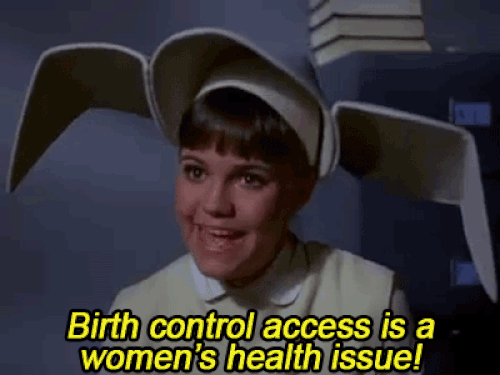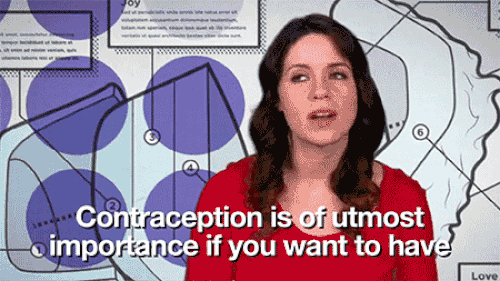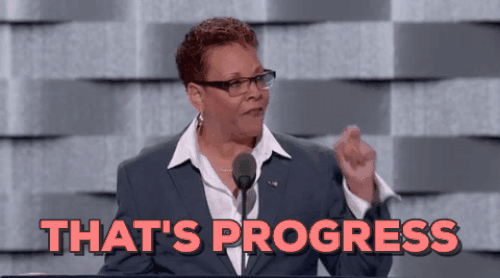The 13 States Doing The MOST To Protect Your Access To Affordable Birth Control
(Thumbing our noses at you, GOP!)

The last few months have been more than stressful when the war on birth control was declared.
Then, as if things couldn't get any worse, President Donald Trump hired birth control opponent Katy Tolento as domestic policy counsel for health care. Not only does Tolento believe that birth control causes miscarriages and abortions, she also feels it limits a woman's ability to have children.
Talk about increasing the tension!
With the demise of the ACHA repeal, sex-loving people everywhere can rejoice that their reproductive rights are soon to be back under their own power of choice.
Millions of Americans are keeping their health care coverage, and women can stop stocking up on birth control pills out of fear. To women who planned on switching to IUDs, despite potential side effects — rest easy, for now.
Once the GOP bill failed, women (and men) everywhere finally breathed a sigh of relief.
But we're not out of the woods just yet.
At the end of March, as expected, Mike Pence cast a tie-breaking vote to defund Planned Parenthood. That means access to birth control options will need state-funded support to ensure women (and men) have access — more than ever before.
As long Donald Trump remains in office, and the GOP controls Congress, many women and men will be uneasy as they seek new ways to overhaul health care including insurance coverage for birth control.
In short, the future of birth control remains unsafe.
It's scary when it feels like everyone has a say in how you prevent an unwanted pregnancy except for you.
Thankfully, with the threat of Trump on the horizon, states anticipated harsh times. Many introduced laws to protect birth control access for their residents and more states have plans to join the birth control movement.
Depending on your state of residence, your local legislation may be working in your favor.
Most state health-care agencies provide condoms for free at various clinics. And the Affordable Health Care Act requires nearly all health insurance plans to provide free birth control. New legislative bills at the state level are in development to protect access. Access to birth control by state definitely varies in approach, and some are better than others.
Here is a rundown of 13 states that are strengthening current laws and creating new bills on birth control policy to protect free access:
1. In Alaska, a bill is in the works that will allow women to get free birth control for up to a year without a visit to their doctor for a new script.
In 2016, Senate Minority Leader Berta Gardner, an Anchorage Democrat, introduced a bill (SB 156) in Alaska, which is now in the hands of Labor and Commerce. The bill would allow women to receive 3 month's worth of birth control the first time it's prescribed, then a year's worth of birth control thereafter. Insurance companies are not allowed to refuse reimbursement even if the type of birth control being used changes. The bill also covers birth control for men in the form of vasectomy.
2. In California, women are able to get free birth control.
In 2016, California implemented a new law that allows women to get free birth control without a prescription, but cooperation from some pharmacists has become an issue. This has posed a burden for some women who have tried to get birth control under the protection of the new law.
3. In Vermont, free birth control options include vasectomy procedures, and Plan B does not require a prescription.
Vermont is included in the list of three states that provide free birth control to men in the form of vasectomy procedures. In Vermont, women are able to get Plan B, a form of emergency contraception, also known as the "Morning After Pill, or Plan B" without a prescription if she is 18 years old or older.
4. Illinois currently has the most comprehensive birth control laws in the country.

When Gov. Bruce Rauner signed House Bill 5576, birth control rights protected under the Affordable Health Care Act expanded. The State Journal-Register reports, "HB 5576 requires that all of those options be covered without co-payments or deductibles, at least for women covered through health plans regulated by the state and plans that cover state employees, retirees, and their dependents." Women can request a 12-month supply of birth control at one time. The state is working toward providing free vasectomy procedures to men as well.
5. Maryland offers free birth control for both men and women.
Maryland Gov. Larry Hogan (R) signed The Contraception Equity Act that will start in 2018. The law requires insurance companies to provide no-cost birth control to both men and women. From vasectomies to the Morning After Pill, individuals are able to obtain birth control with no out-of-pocket expense. Birth control pills can be obtained for six months at a time, and there are no pre-authorization requirements for long-term birth control options like the IUD. These birth control laws apply only to insurance companies regulated by Maryland.
6. Women in Colorado can obtain oral contraceptives from their pharmacists.
Colorado has provided free birth control to residents for the past five years with good outcomes. For up to three years, women will be able to get birth control directly from a pharmacist. Women are required to complete a short screening to make sure that they are not already pregnant and free of any medical conditions that prevent them from safely taking oral contraceptives. Under Medicaid, Colorado even covers vasectomies for men through their Health First Colorado program.
7. Delaware will soon offer women same-day birth control access for women.

Facing an unplanned pregnancy rate of 57 percent, Delaware's Governor Jack Markell decided to improve birth control access for women. The new law, Delaware CAN (Contraceptive Access Now) will open access to women through long-acting reversible contraceptives free of charge. Funding will come from a combination of private sources and the state Division of Public Health.
8. Women in Hawaii can obtain birth control by speaking to a health-care provider via video call.
In mid-2016, Hawaii changed its birth control laws to open up access. Although there is a cost to see a health-care provider and birth control isn't free, women can get up to a 12-month's supply of contraceptives. In addition to screenings for birth control, women can keep their health care provider up-to-date by sending medical information, such as blood pressure readings, online to monitor birth control side effects.
9. Nevada is working to change how women have access to birth control and increase prescription time without a follow-up visit with their doctor.
Lawmakers in Nevada are promoting a new bill to allow women access to birth control for up to 12 months without having to see a doctor again. They are also working on making it more affordable by ensuring insurers provide contraceptives without charge, regardless of religious objections.
10. Birth-control laws in New Jersey now allow pharmacists to prescribe birth control when needed, even to minors.
The New Jersey law on birth control access was passed in the summer of 2016, and like California, pharmacists need to go through a training on how to screen patients first. There's some question as to how pharmacists should charge for screenings. Pharmacists will not only be allowed to administer contraceptives, but they will also be permitted to deny them.
11. In New Mexico, the provisions of birth control under Obamacare are now state law.
In anticipation that health care would be deferred to the states, New Mexico passed a bill similar to what was covered under Obamacare but with a few extra protections extended to men. Now, men can get vasectomies at no cost and women can get up to one-year of oral contraceptives at a time.
12. New York prepared to protect birth control access by creating new laws to ensure it remains free.
Under the pressure of ACHA Reform, New York attorney general Eric T. Schneiderman took action and introduced The Comprehensive Contraception Coverage Act of 2017. This act opens up birth control to include male contraception and protects women's right to free birth control under state law. The state also plans to strengthen its sex ed programs in schools for youth.
13. Oregon may soon require health insurers to cover most services related to reproductive health.
The new bill was introduced by Democratic state Rep. Jeff Barker. Oregon will cover birth control-related health care services, prescriptions, and non-prescription products including the pill, patches, and rings without cost to the patient. Patients will not have to see a doctor but can get screened and scripted by their local pharmacist.
The bright side to this bad experience is the heightened awareness it has brought to the birth control conversation. The war on birth control has many lawmakers working harder than ever to focus on full inclusion of groups and to protect the future of birth control access, not only for women but for men and teenagers, as well.












